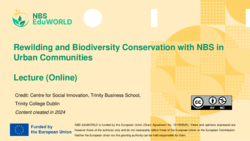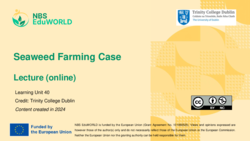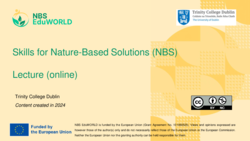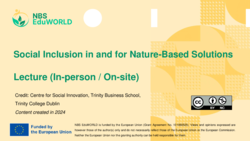
Learning Units
The NBS EduWORLD Learning Units page offers a comprehensive and flexible suite of resources designed to integrate Nature-Based Solutions (NBS) into higher education and professional training. With 50 curated Learning Units, this platform supports educators, students, and practitioners at all levels—undergraduate (UG), postgraduate (PG), doctoral (PhD), vocational, and entrepreneurial.
Covering a broad spectrum of themes and contexts, the Learning Units are structured around key educational streams:
- Common Core Units introduce foundational NBS concepts, such as ecosystem services, biodiversity, and the SDGs.
- 3rd Level Units target university-level learners, with a focus on implementation, policy, social inclusion, and future urban development.
- Entrepreneurial Units support learners exploring nature-based enterprises, business models, green finance, and sector-specific NBS opportunities.
- Vocational Units are tailored for practical skills development, project management, policy engagement, and multi-level governance.
- Case Studies and Workshops offer real-world applications and participatory methods from NBS EduWORLD demonstrator sites across Europe.
Each unit is aligned with European Qualification Framework (EQF) levels, ranging from Level 6 to Level 8, ensuring academic relevance and adaptability.
These Learning Units are editable and adaptable, supporting custom integration into curricula, practice-oriented, blending theory with applied learning, and geographically diverse, reflecting urban, rural, and coastal NBS contexts.
Download the full list of Learning Units
Whether you're a lecturer seeking ready-to-use teaching materials, a student exploring sustainability, or a professional upskilling in green innovation, the NBS EduWORLD Learning Units offer a unique, user-friendly gateway into nature-based thinking and action.
Search results ( 31 - 35 of 41 )
Review
This unit revisits the concept of Nature-Based Solutions (NBS), highlighting their critical role in addressing urban challenges related to climate change, biodiversity, and health. The session also explores tools for scaling NBS, the importance of community collaboration, and how EU policies support the widespread adoption of NBS, focusing on projects like smart cities and re-wilding efforts.
Find here the editable version and the teaching note.
Educational Level: Higher Education
Language: English
Organisation: TCD

Rewilding and Biodiversity Conversation with NBS in Urban Communities
This learning unit explores how nature-based solutions can be applied to rewilding to promote biodiversity, create new ecosystems, and restore degraded urban landscapes. By examining the combination of rewilding and conservation strategies, learners can assess how this can enhance or strengthen ecosystems. Learners are presented with examples of NBS use in rewilding and biodiversity conservation to reflect on the benefits to the ecosystem and sustainability.
Find here the editable version and the teaching note.
Educational Level: Higher Education
Language: English
Organisation: TCD

Seaweed Farming Case
Seaweed farming is emerging as a promising Nature-Based Solution for coastal resilience and climate change mitigation. This unit explores the environmental and economic benefits of seaweed farming, including carbon sequestration, coastal protection, and sustainable food production. The session also highlights EU-funded projects that support the growth of the seaweed farming industry.
Find here the editable version and the teaching note.
Educational Level: Higher Education
Language: English
Organisation: TCD

Skills for NBS
This unit discusses the variety of career opportunities in the NBS sector, including roles in urban planning, environmental science, community engagement, and technology. Students will learn about the skills and qualifications required for these careers, as well as the importance of EU research projects, entrepreneurship, and business innovation in the growing NBS field.
Find here the editable version and the teaching note.
Educational Level: Higher Education
Language: English
Organisation: TCD

Social Inclusion in and for Nature-Based Solutions
The integration of NBS may exacerbate social exclusion, such as greening projects contributing to increased rents and, as a result, the displacement of residents. Political will and awarenes of greening through NBS needs to be in place to enact NBS in communities, which may not be in place or prioritised for disadvantaged communities. This Learning Unit explores the challenges of inclusion and NBS implementation along with the unintended consequences of exclusion that may occur through case study analysis through pathways of inclusion Learners gain a deeper understanding that NBS needs to involve diversity in community and stakeholder engagement, including from under-represented voices to ensure equal access, participation and benefits of NBS for all.
Find here the editable version and the teaching note.
Educational Level: Higher Education
Language: English
Organisation: TCD


Funded by the European Union. Views and opinions expressed are however those of the author(s) only and do not necessarily reflect those of the European Union or the European Commission. Neither the European Union nor the granting authority can be held responsible for them.